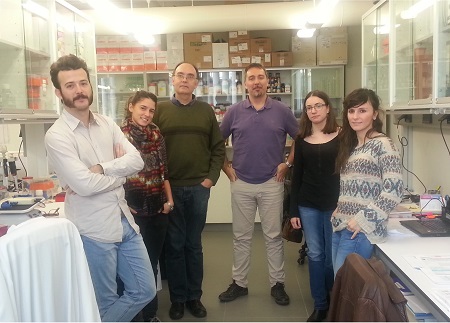A work led by a group of the Universitat de València, published in the journal Nature Communications, has deciphered one of the first steps of conversion of adult cells into induced pluripotent stem cells: the fission of mitochondria. The research provides clues of the first moments of the creation of tumours and allows to simplify the generation of these type of cells for their use in regenerative medicine.

Pluripotent stem cells has become in a fundamental tool in biomedical research and Regenerative Medicine, although the process of cells reprogramming by which they are produced remains still a mystery. Induced pluripotent stem cells (iPS cells) are obtained in the laboratory through genetic manipulation with adult cells extracted from an organism, like blood cells.
In the study, conducted by the researcher Josema Torres, have participated the Department of Cellular Biology (in which Torres is member) and the Department of Biochemistry and Molecular Biology of the Universitat de València; the Experimental Unit of Hepatology of the Health Research Institute La Fe of Valencia; and the Centre of Regenerative Medicine in Barcelona. The research, Early ERK1/2 activation promotes DRP1-dependent mitochondrial fission necessary for cell reprogramming, not only shows that the fission of mitochondria is a essential step for the process of cells reprogramming but, it deciphers the molecular mechanism which controls mitochondria fragmentation and identify the proteins implicated in the execution.
Due their properties of uncertain division and pluripotency, iPS cells are an unlimited source of any type of adult cells, which allow them to obtain through these cells affected by an illness, which in other way wouldn’t be accessible, in a sufficient number for their study.
This way, it can be researched in the laboratory what is working bad in illness cells of an individual to theses cause the manifestation of illness. These qualities put them in a privilege place to be made, in a not far future, as a essential tool in Regenerative Medicine and pharmaceutics industry.
‘Our work has identify the mitochondria fission like the first physiological barrier that adult cells have the solve to become pluripotent. Moreover, we has deciphered the molecular mechanism which regulates the mitochondria fission, by identifying molecular targets to the improvement and inhibition of the process’, has indicated Josema Torres.
Mitochondria fission is a process through are divided mitochondria (organelle cells which are responsible of the production of energy in cells). One of the facts that attract attention of this study is the similarity of the reprogramming process with the process of transformation of common cells into tumorous cells by the activation of oncogenes. ‘In fact, our team and other laboratories had observed that iPs cells and tumorous cells have small mitochondria which favour the quick growth’ sais Josema Torres, ‘which made us to research if the mitochondria fission was important for the conversion of the adult cells into iPS cells’.
Further that this work opens the door to simplify the generation of iPS cells through the use of activators of mitochondria fission, the researchers have highlighted the similitudes between the cell reprogramming, and the transformation of healthy cells into oncogenes. This fact make them to think that deciphered knowledge in this study can be value to understand the first steps of the tumour generation. So, the modulation of the targets identified in the process of mitochondria fission described by the researchers of the Universitat de València, could be extremely useful in treatments against cancer.
Mitochondria fragmentation
Josema Torres explains the molecular mechanism which controls the fragmentation of the mitochondria and identify the proteins implicated in the execution: ’ We observed that mitochondria fission during the cells reprogramming depended on the protein Drp1 which, after its activation, was accumulated in the mitochondria and strangled it until it broke’ explains the researcher
‘As well, we sensed the molecular mechanism thanks to published work during the development of our study, where kinase ERK1/2 were related with the activation od Drp1 and the fragmentation of mitochondria during the cellular transformation of healthy cells into oncogenes’, continues the Valencian scientist.
‘We proved that kinase ERK1/2 were activated during the cellular reprogramming and activated the Drp1, causing its accumulation in the mitochondria and causing the organelle fission’ continues Torres. ‘The most important and laborious to us was to find the factor responsible of the ERK1/2 activation during the first steps of the cellular reprogramming. We observe that during this first step of the process the expression of a negative regulator of the kinase ERK1/2, the phosphatase of Dusp6 proteins, was repressed. This way the repression of this negative regulator was the first responsible of the activation of the kinases in the cells and they will cause the translocation of the Drp1 to the mitochondria to cause the mitochondria fission’ ends Josema Torres.
The research has been financing by the project PI12/00638 of the Fondo de Investigación Sanitaria Carlos III in collaboration with Fondos FEDER “Una manera de hacer Europa”.
Article:
Javier Prieto, Marian León, Xavier Ponsoda, Ramón Sendra, Roque Bort, Raquel Ferrer-Lorente, Ángel Raya, Carlos López-García, Josema Torres: Early ERK1/2 activation promotes DRP1-dependent mitochondrial fission necessary for cell reprogramming. Nature Communications. March 2016 DOI: n10.1038/ncomms11124
Images:




















